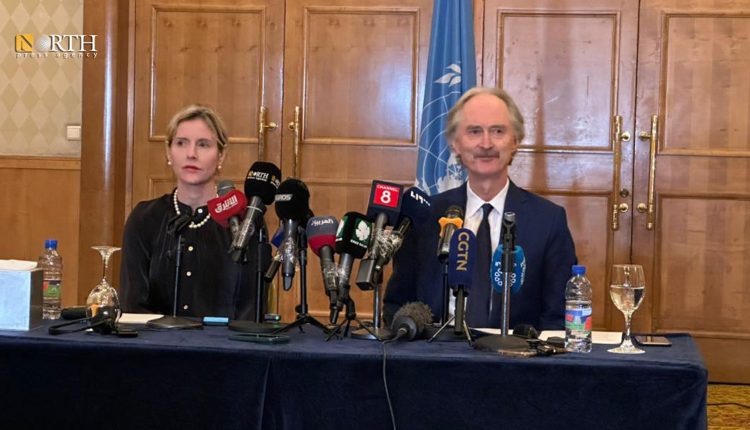UN Envoy Pedersen Expresses Optimism But Fears Autumn in Syria
By Hoshang Hasan
DAMASCUS, Syria (North Press) – UN Special Envoy to Syria, Geir Pedersen, shared his vision for Syria’s situation during a press conference held at the Four Seasons Hotel in central Damascus. Having witnessed various phases of the Syrian conflict, Pedersen appeared optimistic about the prospect of a better future, hoping the coming season would bring the promise of spring.
During the conference, he outlined his priorities, projects, and the challenges facing him and his team, as well as the new administration following the fall of the Assad regime.
Red Lines
Speaking to the media, including Syrian and Arab outlets, Pedersen emphasized the principles guiding his current efforts.
While the key issues can be counted on one hand, their complexities extend far beyond Syria’s borders. One such issue is transitional justice, which Pedersen highlighted as a priority. He revealed that he had discussed this matter twice with the leader of the new administration, Ahmed al-Sharaa.
Pedersen also stressed the urgent need to establish a national Syrian army to maintain the country’s stability. However, he acknowledged the difficulty of this task, given the proliferation of military forces and the fragmented control across Syria.
He firmly rejected what he called the Israeli occupation of Syria, emphasizing the need for Israel’s withdrawal from Syrian territory. Pedersen also reiterated that Syria’s territorial integrity must remain inviolate.
Negotiations with SDF and Fears of Escalation
The UN envoy underlined the importance of resolving the issues in northeastern Syria. He stated that he had conveyed this to Ahmed al-Sharaa, who expressed readiness to pursue a solution, as mentioned during the press conference.
Pedersen expressed optimism about the negotiations between General Mazloum Abdi, leader of the Syrian Democratic Forces (SDF), and Ahmed al-Sharaa, describing them as a constructive step toward Syria’s future.
He called for granting both sides more time and urged careful and cautious handling of the northeastern Syria file, warning that any military option would have catastrophic consequences for all parties involved.
Pedersen avoided directly addressing the continued attacks by the Turkish military and its allied factions on SDF-controlled areas in northern Syria. Instead, he shifted the focus to ongoing U.S. negotiations with Turkey regarding northeastern Syria, revealing that Washington was actively engaged in discussions with Ankara.
As the conference concluded, Pedersen left the hall but affirmed his intention to remain in Damascus and continue listening to the views of Syrians. He stressed that an inclusive political transition must involve all segments of Syrian society.

